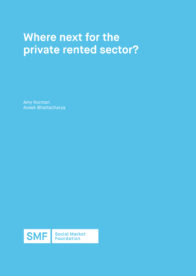This report seeks to understand how the private rented sector might develop in the years to come, on the basis of a nationally representative survey of 1,376 adults in rented accommodation, and modelling of possible future trajectories for the housing market. Our survey finds a clear appetite from renters for policy action – both to improve the experience of renting and to help more renters to buy.
Key points from SMF survey:
- Policy and societal attention (rightly) focus on the minority of private renters that have particularly bad experiences. Yet this can create a misleading impression – the majority of private renters express contentment with their situation: 81% say they are happy with their current property, and 85% say they are satisfied with their landlord.
- The greatest source of dissatisfaction is with “being a renter”, though still only a minority (34%) say they are dissatisfied with this status.
- Satisfaction with private renting is particularly high among older renters: nearly three-quarters (74%) of those aged 55 and over report being satisfied, compared to 58% of those aged 35-54.
- Private renters particularly value not having to pay for repairs, or insurance and other costs; some also see it as a way to afford more expensive locations or to live more flexibly.
- At the same time, there are clear disadvantages to renting:
- 56% of private renters (and 63% of 18–34-year-olds) worry that it is a financially worse option in the long run.
- Renters also dislike the lack of control they have over their property.
- Despite the political focus on security and stability, this came lower down the list of concerns in our survey.
- Overall, most renters are happy to be where they are for now, but most do not see it as their ideal long-term option. Over 50% (two-thirds of 18–34-year-olds, and 39% of 35–54-year-olds) expect to leave the private rented sector in the next 15 years.
SMF recommendations to the Government:
- Enable renters to build wealth while remaining renters – Several innovative schemes could be implemented, including ‘deposit builder ISAs’ that offer a financial return on deposits, or ‘rentership’ models that offer tenants stakes in their building.
- Increase the stability of tenancy agreements – A large majority of renters support a fixed minimum contract length: 69% would be in favour of setting this at 24 months.
- Giving renters more control over their homes – making it easier to keep pets or make reasonable alterations, such as to décor or energy efficiency.
- Increase the accountability of landlords – Through a ‘Good Home, Good Landlord’ kitemark scheme, developed in consultation with renters to recognise landlords that offer good, and not just decent, accommodation.
- Improve the standards of private rented properties – Offer tax incentives for landlords to invest in improvements that align with Good Home Good Landlord kitemark standards, including green investments.

DOWNLOAD THE REPORT PDF
Kindly sponsored by

